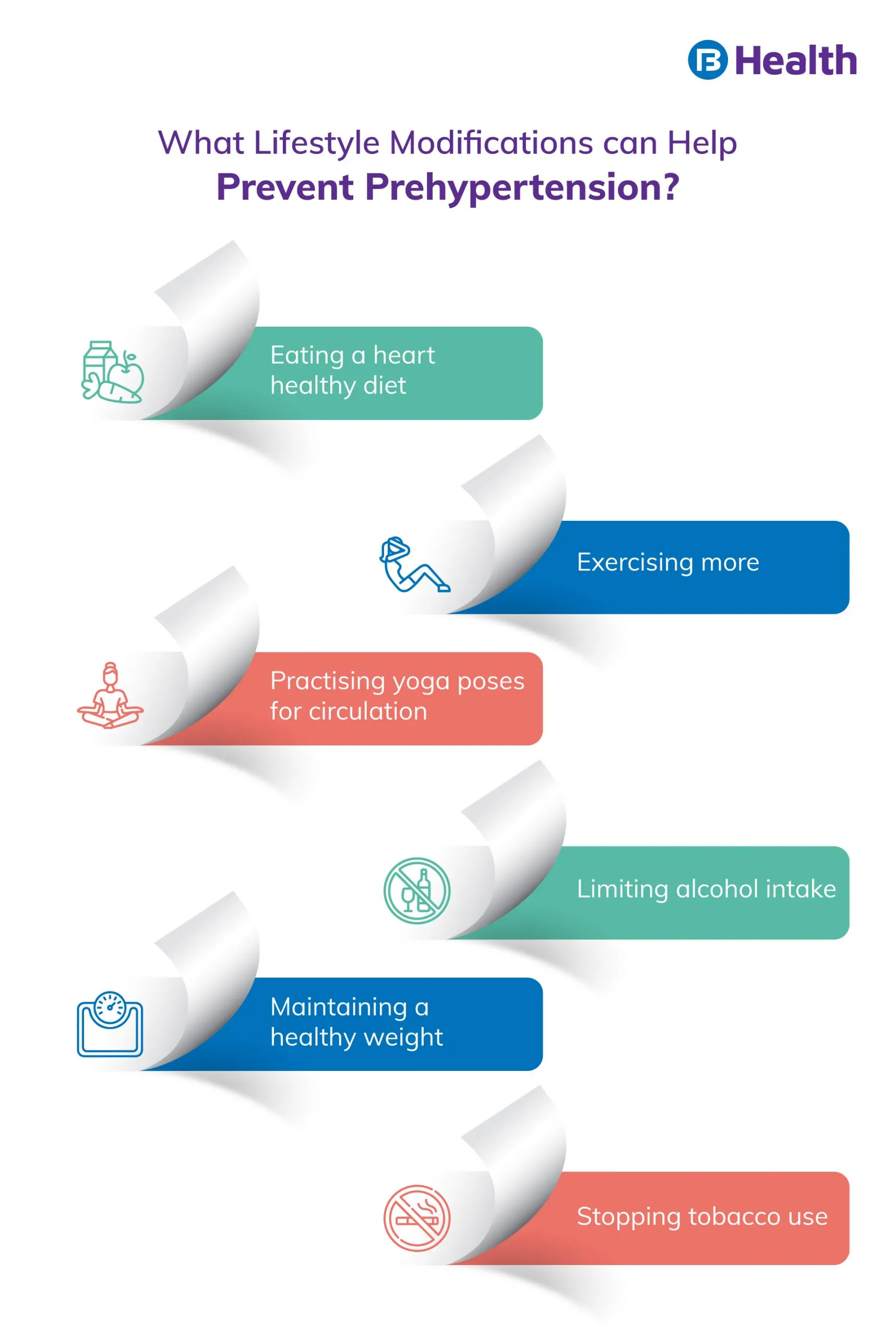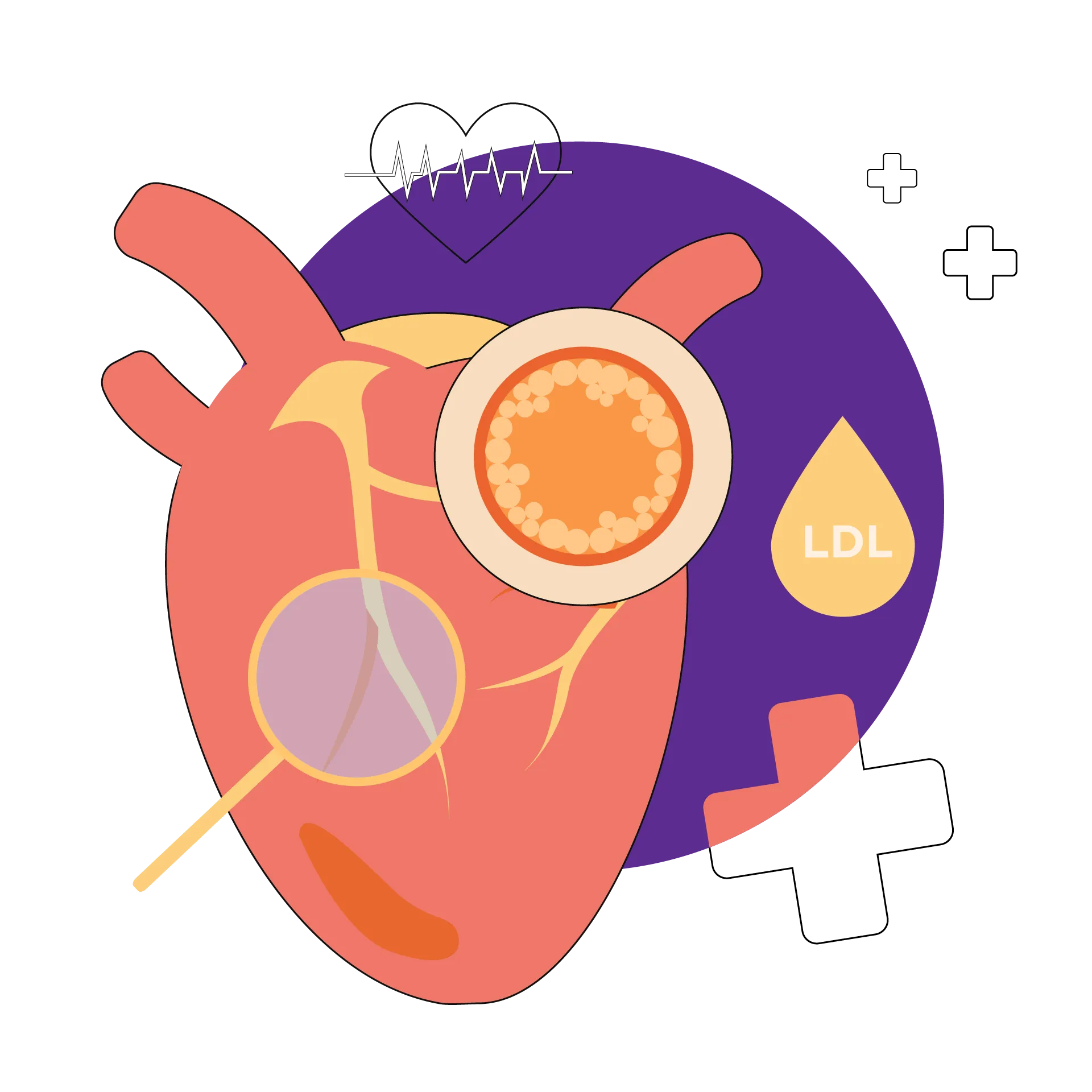Hypertension | 7 min read
Prehypertension: Meaning, Diet and Treatment
Medically reviewed by
Table of Content
Synopsis
Prehypertension or Hypertension Stage 1 is a condition where the blood pressure is elevated but not high enough to be hypertension. It is not a disease but instead a precursor to hypertension and should be taken seriously.
Key Takeaways
- Prehypertension is not a disease but a warning sign of the future development of high blood pressure
- Individuals with prehypertension are more at risk of heart attacks and strokes
- Lifestyle changes like exercising and a low-fat diet can help prevent prehypertension from progressing into hypertension
Meaning of Prehypertension
Prehypertension occurs when blood pressure values are above normal levels and measure between 130/80 and 139/89 [1]. But you need to keep an attentive eye on your blood pressure. High blood pressure causes Prehypertension, which can be a warning sign of future coronary heart disease, heart attack, stroke, heart failure, and kidney failure.
There are chances that prolonged Prehypertension can increase the possibility of you developing Hypertension. Prehypertension detection can thus help you make changes in your lifestyle and prevent suffering from Hypertension and all its associated risks.
Who is at Risk for Prehypertension?
Although approximately 25% to 50% of adults worldwide are affected by Prehypertension, certain factors can put you more at risk.
Prehypertension causes and risk factors include:
- Overweight individuals: Being overweight stresses your body as you need more blood to supply oxygen and nutrients to your tissues. Excessive weight causes more blood to be circulated through your blood vessels, increasing the force put on your artery wall
- Inactive individuals: Not exercising can increase your risk of gaining weight. Also, exercising helps in blood circulation. Another factor that causes weight gain is a sedentary lifestyle
- Family History: You may be genetically inclined to get high blood pressure. If it runs in your family, such as a sibling or a parent has it, you probably will too
- Sex: Prehypertension is more common in men than in women
- Unhealthy diet: High sodium (salt) or low potassium diets are also very harmful as sodium and potassium are vital nutrients in regulating blood pressure and should be taken in moderation and in proper amounts
- Hormonal imbalance: Adrenal glands regulate blood pressure. If they do not work, you might get Prehypertension which will soon be followed by endocrine Hypertension. In such cases, consult an endocrinologist as soon as you can
- Alcoholics or people who drink too much alcohol: Alcohol affects the muscles in your blood vessels and causes them to become narrower, thus making less room for blood to flow
- Tobacco users: Smoking, chewing tobacco, or even second-hand smoke can raise your blood pressure and heart rate
- Chronic conditions: Certain health conditions, including diabetes, kidney disease, and sleep apnea, increase prehypertension risk

How to Know if You Have Prehypertension?
Most people with Prehypertension feel perfectly fine and have normal heart, brain, and kidney functions. Since there are no prehypertension symptoms, measuring your blood pressure is the only way to determine if you have it. To get a more accurate reading visit a general physician to check your blood pressure or use a home blood pressure machine for an approximate reading.
The following table can help you determine whether your readings fall within the normal level or not.
Classification of blood pressure for people over 18 years old:
Classification | Systolic BP | Diastolic BP |
| Normal | Below 120 mm Hg | Below 80 mm Hg |
| Elevated | 120 to 129 mm Hg | Below 80 mm Hg |
| Prehypertension or Hypertension – Stage 1 | 130 to 139 mm Hg | 80 to 89 mm Hg |
| Hypertension – Stage 2 | More than or 140 mm Hg | More than or 90 mm Hg |
| Hypertension crisis | 180 mm Hg above | 120 mm Hg above |
What does Systolic and Diastolic BP Mean?
- Systolic BP: Systolic BP is how much pressure your blood exerts on your artery wall when your heart beats
- Diastolic BP: Diastolic BP is how much pressure your blood exerts on your artery walls when your heart is between beats
More About Hypertension Types
The prehypertension range, as seen earlier, is between 130-139 and 80-89 systolic and diastolic BP, respectively. Beyond this value, different types of Hypertension set in, such as:
- If your systolic blood pressure is more than 130 mm Hg, but your diastolic blood pressure is less than 90 mm Hg, you may suffer from isolated systolic Hypertension. Whereas if your diastolic blood pressure is more than 90 mm Hg and your systolic blood pressure is lower than 140 mm Hg, you might have isolated diastolic blood pressure. Both are similar to Prehypertension and indicate an increased risk of Hypertension
- Hypertension stage 2 is when blood pressure rises and constantly stays at 140/90 mm HG or more [2]. At this point, lifestyle changes won’t be sufficient, and treatment must supplement medications
- A hypertension crisis occurs when blood pressure rises unusually high, causing damage to blood vessels and major organs. There are two types of hypertensive crisis – hypertensive urgency and hypertensive emergency. Hypertensive urgency occurs when a person has elevated blood pressure levels, but no symptoms, and a hypertensive emergency occurs when a person has both high blood pressure and symptoms
- Resistant Hypertension is when high blood pressure levels do not respond to medical treatment

How Often Do You Need to Check Your Blood Pressure?
Regularly checking your blood pressure is an excellent way to know if it’s within the normal range. As the American Heart Association recommends, you should get your blood checked at least once every two years, even if it is normal. However, your doctor may recommend taking readings more often, depending on your medical history and genetics.
Regular health check-ups and blood pressure readings can help in the early detection of any heart disease so that you can fix it before it gets any worse naturally than with medications or surgery.
Is Prehypertension Due to Aging?
Prehypertension is not a normal part of Aging. While women usually develop high blood pressure after age 65, and men develop it by age 64 or above. Studies comparing the populations of Mexico, having a very low salt diet, have shown that age-related increase in blood pressure is much lower in the US. Therefore, no correlation indicates that aging is the direct cause of Prehypertension.
Is There Treatment for Prehypertension?
Since Prehypertension is not a diagnosable disease, there is no standard treatment for it. Treatment should depend on lifestyle changes and not on medications.
Healthy lifestyle changes alone at the prehypertension stage are enough to reduce the risk of Hypertension significantly. However, studies showed that intensive lifestyle intervention could reduce the risk of Hypertension by 20 percent.
Some lifestyle modifications to prevent Prehypertension include:
- Eating a heart-healthy diet
- Exercising more
- Stopping tobacco use
- Limiting alcohol intake
- Maintaining a healthy weight
- Practicing yoga poses for circulation
A 2005 study revealed that moderate physical exercise could effectively lower the blood pressure of those with Prehypertension. You don’t need to strain yourself at the gym or run a marathon. A few simple yoga exercises or brisk walking can do the trick.
Setting up a diet plan consisting of low sodium, low cholesterol, and other unhealthy fats and ensuring it’s high in calcium, fiber, and, most importantly, potassium can benefit your health.
Studies suggest that a Mediterranean diet can help prevent your blood pressure from rising and prevent strokes and type 2 diabetes. After all, we’ve all heard the saying that prevention is better than cure.
Diet for Prehypertension
- Eat fruits, vegetables, nuts, seeds, potatoes, legumes, fish, extra virgin olive oil, and whole grains
- Eat eggs, cheese, and yogurt in moderation
- Avoid eating red meat
- Avoid added sugars, processed food, sugary drinks, and refined oils
Many people with Prehypertension go about their day unaffected, and most people do not even know they have it. As we’ve seen in this article, Prehypertension is a stage between normal blood pressure and Hypertension. Therefore, it is vital to get your blood pressure checked routinely. If your levels match the prehypertension range, you must start making lifestyle changes or monetary arrangements, such as getting health insurance, as you are more likely to develop other heart-related diseases. Treating Prehypertension and not letting it progress to Hypertension is what you should aim for, as dealing with Hypertension is more complex and costly.
If you have more heart-related queries, head to Bajaj Finserv Health for online doctor consultation. It’s best to be proactive in matters of the heart!
References
- https://www.ncbi.nlm.nih.gov/pmc/articles/PMC514035/
- https://www.cdc.gov/bloodpressure/about.htm
Disclaimer
Please note that this article is solely meant for informational purposes and Bajaj Finserv Health Limited (“BFHL”) does not shoulder any responsibility of the views/advice/information expressed/given by the writer/reviewer/originator. This article should not be considered as a substitute for any medical advice, diagnosis or treatment. Always consult with your trusted physician/qualified healthcare professional to evaluate your medical condition. The above article has been reviewed by a qualified doctor and BFHL is not responsible for any damages for any information or services provided by any third party.





